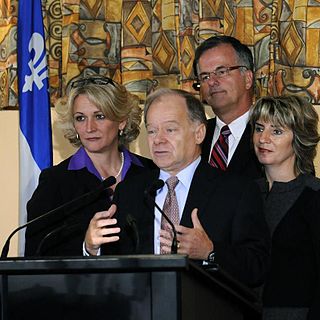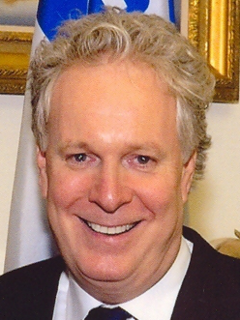
The Bloc Québécois is a federal political party in Canada devoted to Quebec nationalism and the promotion of Quebec sovereignty. The Bloc was formed by Members of Parliament (MPs) who defected from the federal Progressive Conservative Party and Liberal Party during the collapse of the Meech Lake Accord. Founder Lucien Bouchard was a cabinet minister in the federal Progressive Conservative government of Brian Mulroney.

The Parti Québécois is a sovereignist and social democratic provincial political party in Quebec, Canada. The PQ advocates national sovereignty for Quebec involving independence of the province of Quebec from Canada and establishing a sovereign state. The PQ has also promoted the possibility of maintaining a loose political and economic sovereignty-association between Quebec and Canada. The party traditionally has support from the labour movement, but unlike most other social democratic parties, its ties with organized labour are informal. Members and supporters of the PQ are nicknamed péquistes, a French word derived from the pronunciation of the party's initials in Quebec French.

This section of the Timeline of Quebec history concerns the events between patriation of the British North America Act and the present day.

Jean-François Lisée is a Quebec nationalist politician who served as the leader of the Parti Québécois from October 2016 until October 2018. He was first elected a member of the National Assembly of Quebec in the 2012 Quebec election in the electoral district of Rosemont.

François Legault is a Canadian politician serving as 32nd premier of Quebec since 2018. A member of the Coalition Avenir Québec (CAQ), he has led the party since its founding in 2011. Legault sits as a member of the National Assembly (MNA) for the Lanaudière region riding of L'Assomption. Prior to entering politics, he was the co-founder of the Canadian airline Air Transat.

Philippe Couillard, is a Canadian business advisor and former neurosurgeon, university professor and politician who served as 31st premier of Quebec from 2014 to 2018. Between 2003 and 2008, he was Quebec's Minister of Health and Social Services in Jean Charest's Liberal government and was MNA for Mont-Royal until he resigned in 2008. In the 2014 election, Couillard moved to the riding of Roberval, where he resides. He was the leader of the Quebec Liberal Party from 2013 to 2018. He resigned as Liberal leader and MNA on October 4, 2018.

Raymond Bachand is a former politician, a businessman and a lawyer in Quebec, Canada. He was the Member of the National Assembly of Quebec (MNA) for the riding of Outremont, and a member of the Quebec Liberal Party caucus. He is the former Minister of Finance and Revenue in the majority government of Premier of Quebec Jean Charest, and was previously Minister for Tourism during the minority government mandate from April 2007 to October 2008, and Minister of economic development of innovation and export trade from his election until June 2009. Bachand is a former trade unionist. On August 26, 2013 Bachand resigned his seat.

The 2008 Quebec general election was held in the Canadian province of Quebec on December 8, 2008. The Quebec Liberal Party, under incumbent Premier Jean Charest, was re-elected with a majority government, marking the first time since the 1950s that a party or leader was elected to a third consecutive mandate, and the first time for the Liberals since the 1930s, when Louis-Alexandre Taschereau was Premier.

The 2012 Quebec general election took place in the Canadian province of Quebec on September 4, 2012. Lieutenant Governor Pierre Duchesne dissolved the National Assembly on August 1, 2012, following Premier Jean Charest's request. The Parti Québécois were elected to a minority government, with Pauline Marois becoming the first woman to be Premier of Quebec. The Quebec Liberal Party took second place, with Premier Jean Charest losing his seat. The newly formed party Coalition Avenir Québec led by François Legault took third place, while Québec solidaire took 2 seats out of the 125.

The Coalition Avenir Québec is a Quebec nationalist, autonomist and conservative provincial political party in Quebec.

The 2014 Quebec general election was held on April 7, 2014 to elect members to the National Assembly of Quebec.

The 41st National Assembly of Quebec consists of those elected in the 2014 general election. Philippe Couillard (Liberal) is the premier.

The 2015 Parti Québécois leadership election was held from May 13 to May 15, 2015 as a result of the resignation of Parti Québécois leader Pauline Marois after the defeat of her government in the April 7, 2014 provincial election.

The 2018 Quebec general election was held on October 1, 2018, to elect members to the National Assembly of Quebec. The election saw a landslide victory for the Coalition Avenir Québec (CAQ) led by François Legault won 74 of 125 seats, giving the party a majority and unseating the Quebec Liberal Party. The Liberals became the Official Opposition with 31 seats.
The 2016 Parti Québécois leadership election occurred from October 5 to October 7, 2016 due to the resignation of Parti Québécois leader Pierre Karl Péladeau on May 2, 2016. Jean-François Lisée was elected on the second ballot with 50.63% of the vote.

Dominique Anglade is a Canadian politician who currently serves as the leader of the Quebec Liberal Party and leader of the Official Opposition of Quebec. She has served as a Member of the National Assembly of Quebec since 2015, representing Saint-Henri–Sainte-Anne. She was the first woman to lead the Quebec Liberal Party, the first black woman to lead a provincial party in Quebec, and the first person of Haitian descent to be a cabinet minister in Canada. She is the daughter of the academic Georges Anglade.

The 2019 Bloc Québécois leadership election was initiated by the resignation of party leader Martine Ouellet in June 2018. While originally scheduled to be held on February 24, 2019 on a one member, one vote basis, Yves-François Blanchet, as the only candidate in the race following the nomination deadline of January 15, 2019, was officially acclaimed Leader of the Bloc Québécois on January 17, 2019.

The 42nd National Assembly of Quebec consists of those elected in the October 1, 2018, general election. As a result, François Legault became Premier on October 18.

The 2020 Quebec Liberal Party leadership election was to have taken place from May 30–31, 2020 after outgoing leader Philippe Couillard resigned on October 4, 2018, and left politics after the party finished second in the 2018 Quebec general election. On March 20, 2020, the party suspended the election indefinitely due to the COVID-19 pandemic in Quebec. On May 11, 2020, candidate Alexandre Cusson withdrew from the race and after a meeting of the party's executive committee, the sole remaining candidate, Dominique Anglade, was selected as leader by acclamation.
An Act respecting the laicity of the State is a Quebec law enacted by Bill 21 and tabled by the ruling Coalition Avenir Québec (CAQ) on March 29, 2019. It is the first Quebec law stating that "The State of Québec is a lay State ." Since it was passed, new hires among public workers in positions of coercive authority have been banned from wearing religious symbols. It also mandates having one's face uncovered to give or receive specific public services.


















